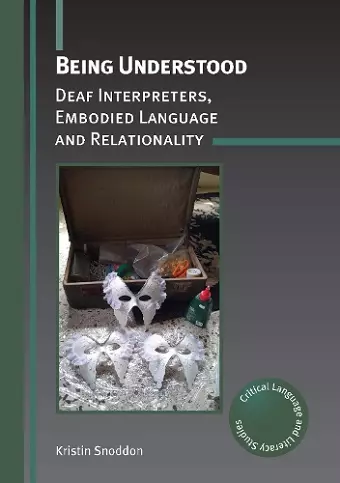Being Understood
Deaf Interpreters, Embodied Language and Relationality
Format:Hardback
Publisher:Multilingual Matters
Published:11th Nov '25
Should be back in stock very soon

Provides a valuable contribution to the understanding of deaf people’s experiences from a feminist-inspired philosophical perspective
Through a series of linked applied linguistics studies regarding the primacy of text, signing songs, the mediation practices of deaf interpreters and Caribbean deaf epistemologies of language and understanding, this book outlines theoretical and methodological approaches to analyzing deaf people’s experiences of understanding and being understood.
Experiences of not understanding and not being understood during interactions are a pervasive aspect of life for many deaf people, so ensuring understanding becomes a moral imperative in deaf worlds and part of deaf ontologies. Through a series of linked applied linguistics studies regarding the primacy of text, signing songs, the mediation practices of deaf interpreters and Caribbean deaf epistemologies of language and understanding, this book outlines theoretical and methodological approaches to analyzing deaf people’s experiences of understanding and being understood. These are grounded in a Continental philosophy of language and qualitative methods including autoethnography, interpretative interviews and phenomenology. The book explores issues surrounding linguistic and semiotic repertoires; access and affordances; orientation, sociality and power; and mediated communication. Ultimately, it reveals both the workings of epistemic injustice related to deaf signers and ways of understanding and being understood that extend beyond named languages.
What does it mean to be understood as a deaf person? Kristin Snoddon asks from the borderlands of lived experience: deaf, deafblind and hard of hearing people as writers, song signers, interpreters, dancers, musicians. By illuminating deaf worlds of (not) understanding and (not) being understood, layers of alienation and shame are reshaped into sites of linguistic flourishing. * Gabrielle Hodge, University of Edinburgh, UK *
This powerfully written book offers intimate portraits and generative analyses of less-attended-to deaf practices such as writing, music, and translation in Canada and Trinidad and Tobago. Grounded in disabled feminist methodologies, Snoddon opens up critical and consequential conversations between linguistics, deaf studies, and philosophy. * E. Mara Green, Barnard College, Columbia University, USA *
A masterfully rich meditation on the diversity of the linguistic human experience and expression, which skillfully explores the ethics, politics and policy of language and linguistic alterity in a grounded and deeply humane manner. By closely interrogating the link between knowledge work and self-knowledge, this important book makes a unique and distinct contribution to a trans- and interdisciplinary understanding of the social philosophy of language, and its fundamental challenges, ambiguities and hopes. * Yael Peled, Max Planck Institute for the Study of Religious and Ethnic Diversity, Germany *
ISBN: 9781788921176
Dimensions: 210mm x 148mm x 13mm
Weight: 360g
157 pages